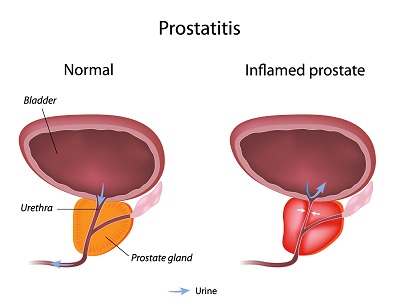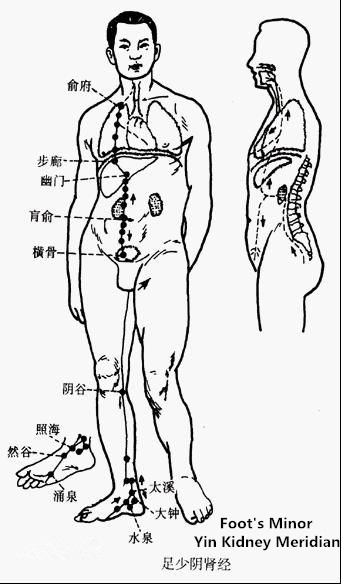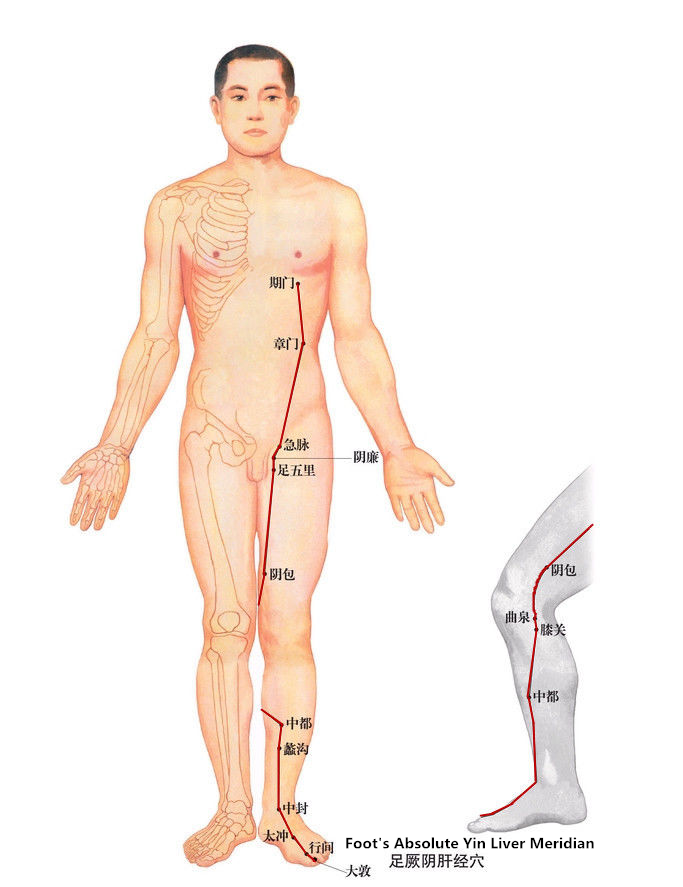What and Where is prostate? What is prostatitis?
Prostate is
walnut-sized gland (organ) in male's reproductive system. It sits below
the bladder, and the urethra (which delivers urine and semen from the
bladder to the penis) runs through the middle of the prostate. The main
function of the prostate is to produce fluid (major component of semen). Prostatitis is often described as an infection on prostate. It might
also be an inflammation with no sign of infection. About 5% to 10% of
conditions are triggered by bacterial infection. Prostatitis can be a
disease for men of all ages. Every year in the United States, there are
about 2 million patients go for urology practices.

Types of Prostatitis
Usually there are three types of prostatitis:
Acute bacterial prostatitis, it refers to bacterial infection in the prostate gland that needs immediate treatment.
Chronic bacterial prostatitis, it happens when there is a spot on the prostate where bacteria can survive and it is a bacterial infection that appears repeatedly. It usually less severe than acute prostatitis, yet it may be a long-lasting condition.
Chronic nonbacterial prostatitis (Chronic prostate pain syndrome, also known as CPPS), this is the most common type of prostatitis, about 90% of all cases. Men of any age could get it. It may be inflammatory or no inflammatory and it could reoccur easily. It has infection-fighting cells in men's prostate fluid or semen, but usually no bacteria can be found when tests are run.
Prostatitis Causes
Bacterial infections cause only 5%-10% prostatitis cases. Their causes haven't been found yet and about 90-95% belongs to chronic pelvic pain syndrome or asymptomatic inflammatory prostatitis described above.
Western Medicine Theory
Prostatitis can be caused by bacteria in the urinary tract that leaks in to the prostate gland (the most frequent bacterial cause) and from direct extension or lymphatic spread in the rectum. A variety of sexually transmitted organisms including Neisseria gonorrhea, chlamydia or HIV may also result it. The exactly causes of non-bacterial prostatitis is not clear.
Chinese Medicine Theory
In terms of considering how illness occurs, Chinese medicine is completely different from Western medicine, it views the human body as an energetic system in dynamic balance. Qi (means Life Energy ) flows through all parts of our body, and the meridian system is a path through which "Qi" flows. (read more at Wiki here)
When the Qi blockages/imbalance occurs, it can lead to certain disease.
Foot's Absolute Yin Liver Meridian (足厥阴肝经) and Foot's Minor Yin Kidney Meridian(足少阴肾经) are the main meridian channel network that runs through prostate. When there is a Qi and blood circulation stagnation, it can lead to prostatitis. In addition, Traditional Chinese Medicine has identified six pathogenic factors, Heat and Dampness are the two main factors of the six, which bring stagnation to energetic system. Our mood, life style, diet and physical condition can influence the internal body environment, a person who eats large amounts of sweet foods, greasy food and has bad habit like smoking or staying up late at night is prone to imbalances of internal heat and dampness. Damp-heat in the lower body is another main causes of prostatitis.


You are at higher risk for getting prostatitis if you:
Having a past episode of prostatitis
Having a pelvic trauma, such as injury from bicycling or horseback riding
Having had a medical instrument recently, like a urinary catheter (a soft, lubricated tube used to drain urine from the bladder) inserted during a medical procedure
Having a pelvic trauma, such as injury from bicycling or horseback riding
Having rectal intercourse
Having an abnormal urinary tract
Having had a bladder infection recently
Having an enlarged prostate
Having certain inherited traits - particular genes may make some men more susceptible to prostatitis
Prostatitis Symptoms
Painful or burning sensation during urination (dysuria)
Difficult urination
Frequent urination, particularly at night (nocturia)
Pain in the abdomen, groin or lower back
Pain in the area between the scrotum and rectum (perineum)
Pain or discomfort in or around penis or testicles
Painful ejaculations
Sometimes there are other symptoms of prostatitis such as blood in the urine and painful ejaculation.
Prostatitis Diagnosis
Ruling out other situations that might be causing your symptoms and determining what sort of prostatitis you may have are included for Diagnosing prostatitis. Diagnosis may include things like the following:
Questions out of your medical professional. Your health-related history as well as your symptoms are something your medical professional desires to know about. Your doctor will ask you to fill out a questionnaire that could enable him make a diagnosis and see no matter whether treatment is operating.
Physical examination. Your abdomen and genitals will be examined by your doctor and he will most likely preform a digital rectal examination (DRE). Through a digital rectal exam, a lubricated gloved finger will gently be inserted by your medical professional into your rectum. Your medical professional will be able judge regardless of whether it is actually enlarged, tender or inflamed when really feeling the surface on the prostate.
Blood culture. This test is utilized to determine no matter whether there are actually indicators of infection in your blood.
Urine and semen test. Samples of your urine or semen for indicators of infection are well examined by your physician. The physician may possibly take a series of samples prior to, throughout and immediately after massaging your prostate with a lubricated, gloved finger in some situations.
Examination using a viewing scope (cystoscopy). The urethra and bladder will be examined by your physician by an instrument known as a cystoscope. A cystoscope can be a compact tube having a light and magnifying lens or camera that is inserted by way of the urethra and into the bladder. To rule out other situations that might be causing your symptoms, this test is utilized.
Bladder tests (urodynamic tests). A single or far more of these tests that are utilized to verify how well you can empty your bladder will be ordered by your physician possibly. This can support your doctor realize just how much prostatitis is affecting your capacity to urinate.
Can hemorrhoids irritate prostate? How to tell if it is hemorrhoids or prostatitis?
Hemorrhoids is a swollen vein or group of veins in the lower rectum and anus. Generally speaking, it can't irritate prostate or lead to prostatitis. Its symptoms are different from prostatitis, patients may experience bleeding and excruciating pain.
Prostatitis, UTI and seminal vesiculitis
Because male's urinary system and reproductive system are closely associated. So, once the urinary system infected with pathogens, it is easily to spread to reproductive organs. In addition, if left urethritis mycoplasma untreated, it can cause complications such as seminal vesiculitis, prostatitis, and even epididymitis.
Prostatitis and Epididymitis
In many cases, prostatitis occurs when there is an infection in or around the testicles (epididymitis/orchitis), you may also have symptoms of that condition. Patient might experiences abdominal/testicular/ejaculation pain, pain with bowel movements and blood in the semen.
Prostatitis, ED and Low Sperm Count
Prostate disease can cause ED and Low Sperm Count, but in many cases, erectile dysfunction is caused by psychological reasons. And hormonal disorders, kidney disease may also be responsible.
If you notice some symptoms and you think you are suffering from these diseases, you should schedule an appointment with your doctor to diagnose.
Prostatitis Treatment
Different urologist has different remedy and these remedies are tailored towards the variety of prostatitis you have.
Antibiotics
The most common treatment for prostatitis, but it is also a controversial treatment. The antibiotics may help if the prostatitis is caused by bacteria, for acute bacterial prostatitis, antibiotics need to be taken for 14-21 days. However, in most cases, prostatitis is not caused by bacteria, antibiotics may help at first due to its anti-inflammatory effects, or it may not help at all. Scientist have found more evidence that long-term use of antibiotics may cause serious side effects and drug resistances.
Pain medicines
Pain Killer aims to decrease the symptoms such as pain and discomfort. It can temporarily help manager your pain, but it can not cure prostatitis completely.
Warm sitz baths
conservative therapies for chronic prostatitis are anti-inflammatory drugs as well as warm sitz baths (sitting in two to three inches of warm water).
Surgery
Surgical removal on the infected portions of the prostate. For severe cases of chronic prostatitis or for males whose swollen prostate is blocking the flow of urine, a physician might advise this remedy.
Prostate massage
Stool softeners and prostate massage as supportive therapies for chronic prostatitis
For chronic noninfectious prostatitis, other treatment options contain the use of the alpha blocker drugs for instance Hytrin, Cardura, Tamsulosin (Flomax), Rapiflo, or Uroxatral. The muscle tissues with the prostate and bladder to improve urine flow and lower symptoms are unwound by these drugs. Other drugs that may support to shrink the prostate gland in some men and reduce the hormone levels, like Proscar.
Alternative Natural Herbal Medicines Treatment
There are many herbal remedies and natural supplements on the market now. Diuretic and Anti-inflammatory Pill is generally considered as one of the best Traditional Chinese Herbal therapies for prostatitis, it is a patented Chinese Herbal Medicine invented by Dr. Lee, and it is made of more than 50 precious natural herbs reasonably, including Plantago seed, Dianthus superbus, talcum, Houttuynia cordata, Polygonum aviculare, herba laminariae, pangolin, saffron, semen persicae, honeysuckle, lignum aquilariae, etc. Based on the Chinese Herbal Medicine theory and modern technology, Diuretic and Anti-inflammatory pill follows the Foot's Absolute Yin Liver Meridian and Foot's Minor Yin Kidney Meridian to promote Qi and blood circulation, it also works to clear dampness and heat in the lower body, kill bacteria, eliminate inflammation, further more, it helps repair damaged urinary and reproductive organs, anti-hyperplasia, anti-fibrosis and boost immune system.
Why recurring prostate infections happen and what you can do when prostatitis keep recurring? For bacteria prostatitis, which is typically treated with antibiotics, it might recur because antibiotics aren’t able to kill all of the bacteria in the view of Western Medicine. On the other hand, Traditional Chinese Medicine thinks when the internal environment does not improved, it is easy to infacted by bacteria. For non-bacteria prostatitis, the damp-heat in lower body and Qi blockage may cause the prostatitis, so, rather than killing the bacteria and eliminating inflammation, improve the internal environment of our body is more than important.
In the past 30 years, we have a large number of successful cases, patients from all of the world get significant improvement in the first month's treatment, depending on each patient's conditions, over 95% patients can be cured in about 3-6 months' treatment.
Consult Dr.Lee The Inventor of The Herbal Treatment Of Male Reproductive System:
Wuhan Dr. Lee's Clinic
Address: Shop 2-2, Nan Hu Xin Cheng, Wenchang Road, Hongshan District, Wuhan, Hubei Province, China.
wuhandrlee@hotmail.com
herbalistlee@yahoo.com
 DR.LEE:
DR.LEE: reply
reply
 DR.LEE:
DR.LEE: reply
reply

